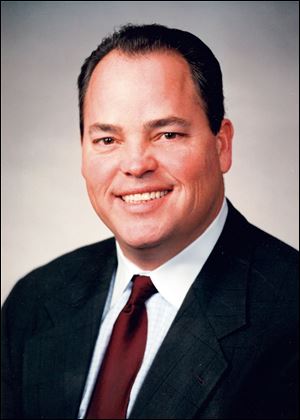
GUEST COMMENTARY
1-day lung clinic provides answers
Expedited patient process allows for earlier diagnosis
8/25/2014

Dr. Ronald J. Wainz is the medical director of the Lung Clinic at ProMedica Cancer Institute.
This is one of a series of columns about health issues written by staff members of ProMedica, Mercy, Toledo Clinic, and the University of Toledo Medical Center, the former Medical College of Ohio.
Lung cancer is by far the leading cause of cancer death among both men and women. Each year, more people die from lung cancer than from colon, breast, and prostate cancers combined.
Often symptoms of lung cancer do not appear until the disease is already in an advanced, noncurable stage. Even when symptoms of lung cancer do appear, many people mistake them for other problems, such as an infection or long-term effects from smoking. Also, diagnosis can be delayed because, until very recently, we have not had effective methods to screen for lung cancer.
Once a problem is suspected, it is not a simple process to diagnose lung cancer and begin treatment. Often many different tests are needed with input from a wide range of specialists.
A common scenario for patients eventually diagnosed with lung cancer might occur like this: A patient goes to the emergency room because he or she is short of breath or thinks he or she might have bronchitis or pneumonia. A chest X-ray or CT scan shows a lesion on a lung. The emergency room physician instructs the patient to follow up with their family physician to determine the cause of the lesion. To allow time for initial treatment and rule out other conditions, additional tests are ordered by the family physician. When, after a few weeks, the initial abnormality persists and suspicion for cancer becomes more significant, the patient then may need to meet with a pulmonologist, a thoracic surgeon, a medical oncologist and a radiation oncologist individually to develop a plan for diagnosis and treatment. Each of these appointments with different doctors might take a week or more to schedule. For some patients, this process — from the day they find themselves in the emergency room to the day they begin treatment — can take one or two months, sometimes longer.
My colleagues and I at the ProMedica Cancer Institute have been concerned for years that the process for diagnosing lung cancer was far too lengthy and should be expedited to allow for earlier diagnosis and treatment for these patients. To streamline the diagnostic and treatment planning process for patients, we have developed a one-day lung clinic at the Hickman Cancer Center on the campus of ProMedica Flower Hospital. Rather than asking the patient to see one specialist on one day and then another one a week or two later, we bring the specialists together for the patient's one-day appointment at the clinic.
In the morning, a pulmonologist meets with the patient for an initial evaluation. The pulmonologist then presents the results of the evaluation to a panel of physician specialists from pulmonary medicine, thoracic surgery, medical oncology, radiation oncology, radiology and pathology. The physicians have a broad-based, multidisciplinary discussion and come to a joint expert recommendation for the care of the patient seen that morning in the clinic. That afternoon, the pulmonologist sits down with the patient to go over the diagnosis and comprehensive treatment plan. Before the patient leaves, they understand what their next steps are.
In addition, if the patient needs to consult with a thoracic surgeon, medical oncologist or radiation oncologist, we can make that happen that same afternoon. Also, if the patient needs a biopsy or additional testing, we will schedule that for the patient before they leave that day.
We believe that better coordinating the path that our patients take to diagnosis will help them get answers to their questions and initiate treatment sooner — leading to better outcomes for those with lung cancer.
Ronald J. Wainz, M.D., is the medical director of the ProMedica Cancer Institute Lung Clinic at Hickman Cancer Center on the campus of ProMedica Flower Hospital. He is also a pulmonologist and intensivist with ProMedica Physicians. For more information, go to promedica.org/lungclinic.